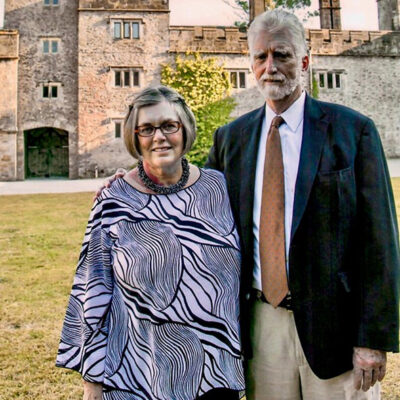John Byrnes is a self-proclaimed “satisfied customer.” Diagnosed with stage IV pancreatic cancer in 2015, John is grateful for each and every day his Dana-Farber care team has given him.
Pancreatic cancer is challenging to treat in its later stages, and also very difficult to catch at an earlier, more treatable stage. Knowing the odds, both John and his wife, Mollie, knew that they needed to go to “the best of the best” for a second opinion. They needed to go to Dana-Farber.
John’s treatment plan included an experimental drug offered in a clinical trial. And while he would not describe his experience as comfortable or an easy road, he and Mollie are grateful that he has survived and lived a very fulfilling seven years—many more years than the original prognosis he was given before coming to Dana-Farber.
“I’m a satisfied customer, and I knew I could trust my team,” said John. “Dana-Farber has A+ people. Every person who touched us makes us feel taken care of, from the receptionist, to the cafeteria workers, to the phlebotomist, to the nurses and doctors.”
One of the most comforting aspects of Dana-Farber for John was his doctors’ willingness to listen and give him options. He and Mollie have expressed their gratitude over the years by giving to Dana-Farber programs that help patients navigate their cancer—including patient assistance, the Blum Family Resource Center Van, and the Hale Family Center for Pancreatic Cancer Research.
Now most recently, the Byrneses have made a very generous gift of $1 million to support clinical research under the direction of John’s doctor, Kimberly Perez, MD.
“We’re motivated to help diagnose earlier, prolong life, and eventually eradicate this dreadful disease,” said Mollie.
With this funding, Perez has launched a clinical trial to test a new combination therapy for patients with localized pancreatic cancer—early stage cancer that has not yet spread to other organs. Perez’s Hale Center colleague Stephanie Dougan, PhD, recently discovered that introducing an inhibitor on the TGF-beta pathway, which is involved in many cellular functions, boosted the efficacy of the chemotherapy used for pancreatic cancer. The Byrneses’ gift will allow Perez to study the blood and other tissue samples from patients on the trial to understand how this new therapy alters the tumor biology, which will shed light on why some patients respond and others become resistant to the therapy.
“This clinical trial marks the first bench-to-bedside translational study to be carried out entirely within the Hale Center—a triumph of collaborative science,” said Perez. “By leading clinical trials, we can change how patients with pancreatic cancer are treated across the globe. We’re so grateful for John and Mollie’s generous support.”
For more stories about the impact of philanthropy at Dana-Farber, please visit DanaFarberImpact.org.



